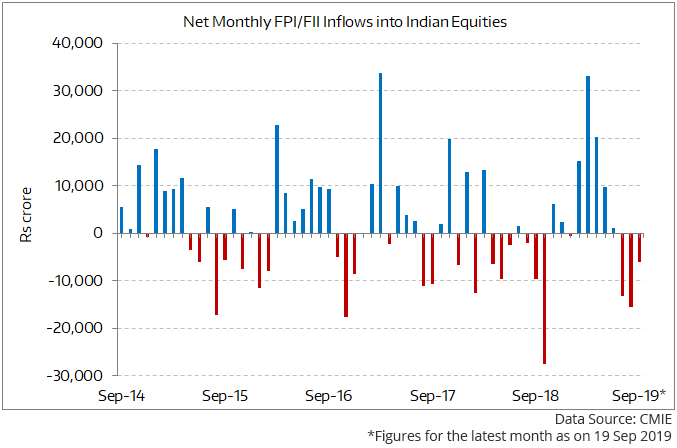India's Third Giant Leap
This Could be One of the Biggest Opportunities for Investors
- Home
- Todays Market
- Indian Stock Market News September 25, 2019
Sensex Opens 300 Points Down; Banking Stocks Under Pressure Wed, 25 Sep 09:30 am
Asian share markets are lower today as Japanese and Hong Kong shares fall. The Nikkei 225 is off 0.5% while the Hang Seng is down 0.8%. The Shanghai Composite is trading down by 0.4%. US stocks fell in volatile trade on Tuesday, giving the S&P 500 its biggest daily drop in a month as a push for the impeachment of Donald Trump gained momentum among Democrats in the US Congress.
Back home, India share markets opened on a negative note. The BSE Sensex is trading down by 300 points while the NSE Nifty is trading down by 79 points. The BSE Mid Cap index and BSE Small Cap index opened down by 0.6% and 0.3% respectively.
Barring consumer durables stocks and power stocks, all sectoral indices have opened the day on a negative note with bank stocks and metal stocks witnessing maximum selling pressure.
The rupee is currently trading at 71.1 against the US$.
The Indian rupee yesterday dropped 7 paise to close at 71.01 against the US dollar as foreign fund outflows and subdued equities weakened forex market sentiment.
However, easing crude oil prices and weaker greenback against rival currencies restricted the rupee fall to some extent.
Foreign investors pulled out Rs 8.3 billion from Indian equities yesterday.
At the interbank foreign exchange market, the local unit opened on a strong note at 70.72, then lost ground and fell to an intra-day low of 71.05 against the American currency.
The domestic unit finally settled for the day at 71.01 against the US dollar, down 7 paise over its previous close.
On September 23, the local unit settled unchanged at 70.94 against the US dollar.
Speaking of FIIs, let's have a look at the monthly foreign investor inflow trend over the last five years.
Will Foreign Investors Make a Comeback Now?
During the entire period, the net foreign investor inflows into Indian equities are worth Rs 118,282 crore. For a five-year period, that's not a significant amount at all. The reason being that foreign investors have also done some heavy selling during this period.
Consider the fact that foreign investors have been net sellers in 27 out of the last 61 months.
In fact, even in the ongoing financial year, foreign investors have been net sellers.
Will that change after the latest announcement by the Finance Minister?
We believe that corporate tax cuts have the potential to revive the business and investment climate in the economy.
Besides the corporate tax cuts, the FM also announced measures to stabilise the flow of funds into the capital markets. The enhanced surcharge announced during the Budget shall not apply to capital gains arising on sale of any security including derivatives, in the hands of Foreign Portfolio Investors (FPIs).
All these measures should Indian equities more attractive to foreign investors. While they have been net sellers so far in this financial year, one could expect them to turn net buyers by the end of March 2020.
So now, what to expect after tax cuts?
In the video below, Vijay Bhambwani presents his view on whether India will expand its policy footprint by way of a rate cut and currency devaluation.
Moving on to the news from the banking sector. The restrictions imposed on the Punjab and Maharashtra Cooperative Bank (PMC Bank) by the Reserve Bank of India has turned its account holders jittery and sent shockwaves in the banking circles.
In the financial year 2018-19, the bank saw increase in stressed assets which affected its financial position.
PMC Bank's asset quality declined as gross non-performing assets (NPAs) ratio - bad loans as a percentage of gross advances, rose to 3.8%, versus 2% in the previous year.
Net NPA too expended to 2.2% during FY19 as compared to 1.1% in FY18.
The bank's absolute gross NPA increased more than two-fold to Rs 3.2 billion in FY19 from Rs 1.5 billion in FY18.
According to PMC Bank's annual report, the bank had made requisite provision as per the guidelines of RBI, to curtail the NPA.
To cleanse the balance sheet, the bank sold NPA portfolio to CFM Asset Reconstruction Pvt. Ltd. (CFMARC) for Rs 1.1 billion as on March 2019.
The RBI issues directives when banks breach banking regulations.
In this case, the Reserve Bank invoked Sub-section (1) of Section 35A of the Banking Regulation Act, 1949 to clamp down on the PMC's banking activity for six months.
Now, what lies ahead for the bank remains to be seen. Meanwhile, we will keep you updated on the developments from this space.
To know what's moving the Indian stock markets today, check out the most recent share market updates here.
For information on how to pick stocks that have the potential to deliver big returns, download our special report now!
Read the latest Market Commentary



Equitymaster requests your view! Post a comment on "Sensex Opens 300 Points Down; Banking Stocks Under Pressure". Click here!
Comments are moderated by Equitymaster, in accordance with the Terms of Use, and may not appear
on this article until they have been reviewed and deemed appropriate for posting.
In the meantime, you may want to share this article with your friends!